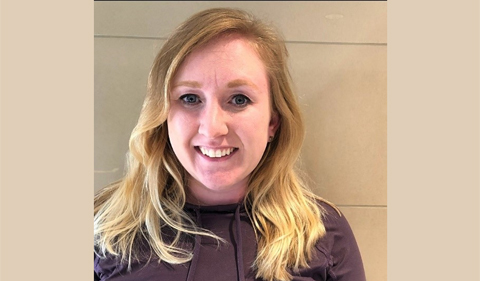Ohio University alumna Laura Seebald’s passion for social justice and public health have led her to the frontlines of the battle against COVID-19 in Kirland, Wash., where she works as a social worker providing discharge planning and mental health services.
She performs multiple roles in this position: connecting patients to resources, completing mental health evaluations, evaluating the safety of discharge plans, and making referrals to other services and agencies based on evaluations of patient’s needs.
Seebald double majored in Geography and Psychology from the College of Arts & Sciences at Ohio University in 2012. From OHIO, she went on to the University of South Carolina, earning a Master of Social Work in 2016. She has worked in the healthcare field since 2016.
“I have always wanted to work in the healthcare and mental health field, but coming from two geographer (and OHIO alumni) parents, I’ve always had a passion for geography, more specifically human geography and health outcomes. I am fortunate to have found an amazing career as a travel social worker where I can address health disparities in different geographical regions,” Seebald says.
For example, while working in the South, Seebald found that one of the biggest barriers to accessing healthcare was lack of insurance. Medicaid was not expanded in South Carolina and most medical transportation services are based on Medicaid funding. People in rural communities are unable to access these transportation services to get to primary care appointments, which in turn leads to poorer health.
Currently while working in Washington, a state that has expanded Medicaid access, it has been easier to connect patients to services, as the majority of them have Medicaid. Washington has an average rate of 8.8 percent of uninsured adults, whereas South Carolina’s rate is almost double that at 16.4 percent. The health outcomes in Washington are also better than what she saw in the Carolinas. In her current work to address needs related to COVID-19, Seebald is excited to see recent progress in Washington state.
“I arrived in Kirkland just days after the first U.S. COVID-19 case was diagnosed. I saw how rapidly the illness spread throughout the Seattle area, then to California, then across the country. Now as the East Coast is being rampaged by the illness, Washington is beginning to flatten the curve and has decreased the average number of positive cases diagnosed daily,” she said.
Seebald’s interdisciplinary background has contributed to her passion for her current work.
“Both my undergraduate and graduate school experiences have had profound impacts on me both professionally and personally. I developed my passion for learning about health disparities while taking several geography courses at OU. Dr. Thomas Smucker sparked my interest in rural livelihoods and food insecurity. During my time in Athens, my eyes were opened to how poverty and rural communities often go hand-in-hand and how this has immense effects on health outcomes,” she said.
“Dr. Geoff Buckley was influential in my undergraduate career as in his courses, I was introduced to the ideas of relationships between cities and environments. While I studied abroad in Edinburg, Scotland on the City and Environment program, I was able to see the opposite side of urban planning and those effects on health outcomes.”




















Comments